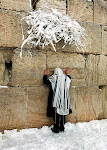The last topic in yesterday's parsha (שופטים) discusses the concept of an egla arufa. In a nutshell - if a dead body is found between two cities and nobody knows who he is or who killed him, the elders of the closest town go out to a dried up riverbank and do a whole ritual that includes breaking a young calf's neck.
The elders (i.e. rabbis) then say a few phrases as indicated by the Torah. One of those phrases is
ידינו לא שפכו את הדם הזה - translated loosely, we didn't kill this guy. Which is a very curious thing - do we really suspect the rabbis of the closest town of murder? We can't find the guy who killed him, so we're gonna point the finger at the nearest beis din?
The gmara itself asks this question, in Maseches Sotah (מו). The gmara explains that this was never our suspicion. Rather, the elders are somewhat at fault here, because they did not send out this traveler with proper accompaniment as he left town. In other words, no one walked him out to say goodbye.
Now, maybe I'm not getting it, but what does that have to do with anything? The village wasn't hospitable enough to escort a visitor out of town, and that got him killed?
Explains the Maharal, yes. There are two types of סייעתא דשמיא in this world, says the Maharal. One for the individual, and a more powerful one for the Klal, the Tzibur, the congregation. If that person had been escorted to his destination, his Mazel would have been different. He would have gone from being a yachid (individual) to a rabim (group). That, perhaps, would have spared him his life.
We see this concept of the power of a tzibur in many areas. An obvious one is davening - chazal say that the tefillos of a minyan are more powerful than of those praying without a minyan. Another proof is the realm of war. The pasuk promises us in Bechukosai ורדפו מכם חמשה מאה ומאה מכם רבבה ירדפו. Five of you will pursue a hundred, and a hundred of you will pursue ten thousand. Rashi points out the discrepancy in the math - five chasing a hundred is 1:20, a hundred chasing ten thousand is 1:100. How does that work?
Rashi explains that spiritual math works differently than physical math. Spiritual math says that when you increase the number of Jews doing something holy (like fighting a war that God commanded), they can do more than a smaller number of Jews doing the same thing.
This is the power of a group. Humans have a great propensity to gather in numbers. We feel the need to congregate, to socialize. This koach, like all kochos that Hashem gives us, can (and should) be used to our benefit.
We all know that it's easier to be "frum" (whatever that means) when we're in a group. When everyone else is interested in growth, then it's easier to grow. When everyone else is not interested in growth, that's where it's especially challenging to get closer to God. Let's use our friends to our advantage. Getting together in a religious setting - whether to learn, daven, or just schmooze about life - can be the difference between incredible growth or ח"ו a stagnated summer. Next time you're in the mood to learn, go out to the beis instead of your dining room. That way, it'll be easier to do it again the next time, because you'll have chevra in place who can help you.
Hatzlacha Raba!

No comments:
Post a Comment